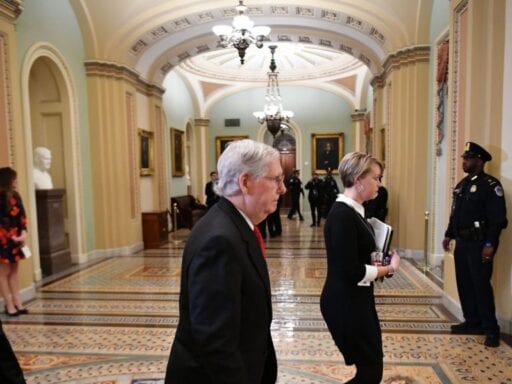Senators will have a chance to ask questions and vote on calling more witnesses.
It’s officially the second full week of the Senate impeachment trial, and that could mean long-gestating questions about calling additional witnesses and the admission of new documents will finally be put to rest.
Throughout these proceedings, Democrats have pressed for the inclusion of more evidence, including the testimony of witnesses who have direct knowledge about the hold the Trump administration placed on Ukrainian aid. Republicans, meanwhile, have broadly resisted.
The coming days are set to be packed: They’ll feature arguments from President Donald Trump’s defense team, an opportunity for senators to finally ask some questions of both House impeachment managers and White House counsel, and a key vote on admitting more evidence into the trial, including witness testimony.
If the motions for witnesses and new evidence get voted down, it’s also possible the trial could conclude with a Trump acquittal as soon as the end of the week.
So far, House Democrats have presented an exhaustive collection of evidence in order to explain why the House approved articles of impeachment — and to make the case for Trump’s removal. Those articles charge Trump with abuse of power and obstruction of Congress, as it relates to his treatment of Ukraine military aid. Across more than 21 hours of arguments, Democrats detailed how Trump conditioned military aid to Ukraine on investigations into his political rivals, and argued that the president would continue to court election interference if he is allowed to remain in office.
Trump’s attorneys, too, had an opportunity to present their arguments beginning on Saturday, when they sought to cast doubt on the facts of the prosecution’s case. His lawyers suggested that the ties between the hold on military aid and a political investigation were tenuous, and argued that the aid’s delay had more to do with concerns about sharing cost with US allies.
In the week to come, the biggest outstanding question is whether Senate Democrats will be able to sway at least four Republicans to join them in voting for the subpoenaing of new witnesses. Democrats are hoping to hear from key members of the Trump administration, like acting White House Chief of Staff Mick Mulvaney and former National Security Adviser John Bolton, who refused to answer subpoenas in the House.
A successful vote on the witness issue would likely extend the length of the trial. Given Senate Majority Leader Mitch McConnell’s focus on a quick acquittal, he is set to keep up his opposition toward witnesses; if lawmakers do not approve additional evidence, they’ll probably move to a vote on the articles fairly rapidly.
Below is a schedule of what to expect for the week ahead:
Monday
Trump’s attorneys have roughly twenty hours on the clock that they can still use, and are expected to continue their opening arguments. Thus far, they’ve focused on raising questions about the fact pattern Democrats have laid out, and are expected to use familiar attacks on the legitimacy of the impeachment process in an attempt to discredit impeachment and individuals like the whistleblower.
Tuesday
Because Trump’s lawyers have signaled that they’re likely to use less time than the Democrats, they could continue their arguments into Tuesday or could wrap Monday. After the defense finishes its arguments, senators in both parties will have a total of 16 hours to ask questions of both sides.
Wednesday
Senator questions will likely take around two days time and could go through Thursday, depending on when the process starts. Lawmakers cannot speak during the trial, and will instead write down their questions. The two parties, if they take the same approach as they did during President Bill Clinton’s trial, are expected to strategically cull this list. In the past, the chief justice of the Supreme Court, who presides over the trial, has read the questions to the chamber.
Thursday
Expect the question-and-answer session to extend into Thursday.
Friday
Senators will decide if they’re interested in considering additional evidence. If 51 Senators are in favor of it, they will then take specific votes on which witnesses to call for testimony and what documents to request.
If the motion to consider additional evidence fails, the Senate could move immediately into a vote on two articles of impeachment, Politico reports. Because Republicans are eager to wrap up the trial, it’s possible they will push for this accelerated timeline.
Saturday
At this point, there’s still a lot of uncertainty about what could happen in the trial, and whether it will continue beyond this week. It could theoretically be over by this time, if Trump is quickly acquitted. If not, Senate deliberations — and witness arrangements — might continue into next week.
Author: Li Zhou
Read More



